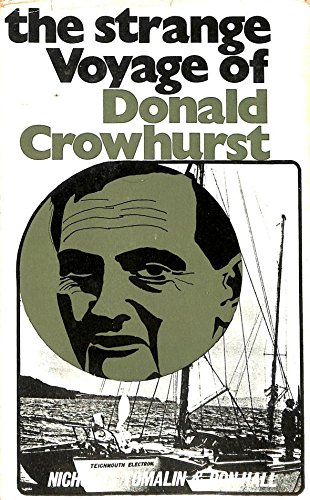By NICHOLAS TOMALIN, RON HALL (Hodder and Stoughton; 1970)
The late Ronald Crowhurst was a deeply obsessive and, yes, strange man, so it’s appropriate that this book about his doomed 1969 voyage is an extremely eccentric and obsessive piece of work in its own right. Written by a pair of newspaper reporters, THE STRANGE VOYAGE OF DONALD CROWHURST seeks to convey the minutiae of the titular voyage in a singularly methodical, Sherlock Holmsian fashion—a requirement, really, as the only person who truly knows what happened on that voyage is dead.
The particulars were thus: Donald Crowhurst, a British businessman and weekend yachtsman, became determined to compete in a round-the-world yacht race. This was despite a complete lack of experience, and nor did he have a workable boat. Nonetheless, Crowhurst used his considerable powers of persuasion to raise a fair amount of money for his undertaking, and even hired a publicist, whose reportage played a not-inconsiderable role in what followed.
According to Crowhurst’s radio transmissions and telegrams the voyage went swimmingly, with numerous records broken and his ship holding up remarkably well. Yet that ship was found abandoned on July 10 (a little over seven months after the start of the voyage), and the logbooks onboard told an entirely different story than the one that was fed to the world. It seems that in reality Crowhurst’s boat was beset by design and construction problems, necessitating an against-the-rules island stop-off, and that contrary to his claims about his progress (cooked up via a complex mathematic scheme) he never made it out of the Atlantic Ocean. Inevitably he descended into madness, and seemingly committed suicide.
There have been many accounts of this tragic tale (most of them of the cinematic variety, with 2018’s ADRIFT being the most recent example), but I can’t imagine any of them besting this one. The detective work done by the authors is staggering in its thoroughness and ingenuity, and the unquestioned bedrock of all subsequent interpretations of Crowhurst’s voyage.
This meticulous approach, alas, makes for a painstaking and at times exasperating read. It doesn’t appear to have occurred to Messrs. Tomalin and Hall that the reader might not find the minutia of this story as interesting as they do. They make sure to provide lengthy transcriptions of Crowhurst’s log entries, poetry and throwaway notes, all of which are subjected to prolonged analysis—likewise Crowhurst’s later log entries, written as madness overtook him and so decidedly incoherent, but still analyzed at great length.
Yet it’s that very obsessiveness that makes THE STRANGE VOYAGE OF DONALD CROWHURST such an essential resource. I may have problems with the authors’ methodology, but must admit that their conclusions are pretty solid.

